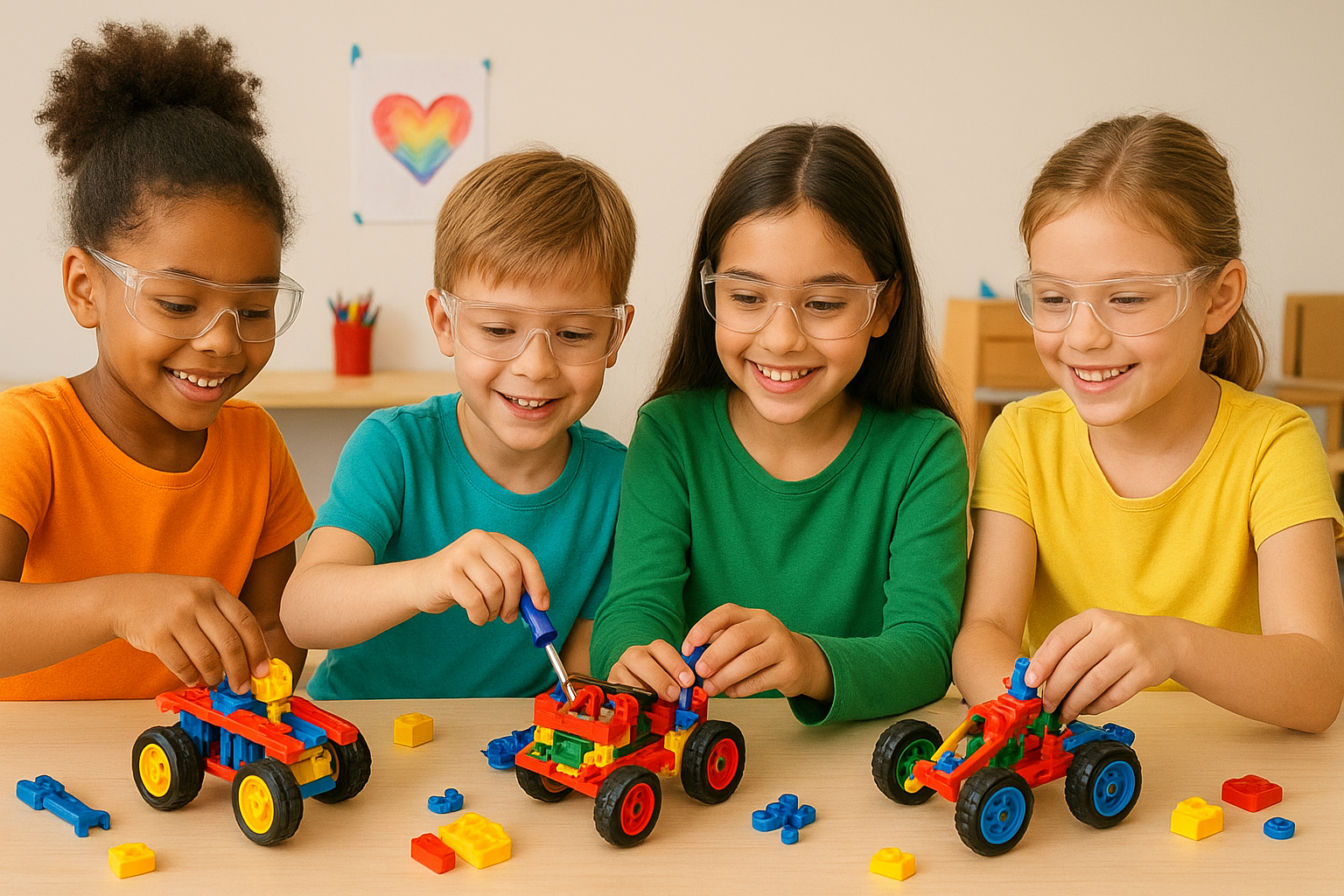STEM Program for Ages 6-8
Inspiring Young Makers Through Hands-On Learning

This group will focus on foundational skills in building, basic circuits, problem-solving, and early engineering concepts through play, art, and tangible projects. Each month delivers hands-on experiences that introduce STEM principles in a highly engaging, age-appropriate format.
Monthly Curriculum
October
- Summary: Introduction to creative building and design thinking.
- Kit: KiwiCo “Playful Structures” (Link: https://www.kiwico.com)
- Meeting Focus: Icebreakers, STEM as fun, demo the kit, how to explore at home.
- Take-Home Work: Build the structures; try alternative materials (e.g. LEGO, straws). Reflect on what makes a strong design.
November
- Summary: Learn about simple machines.
- Kit: KiwiCo “Spin Art Machine”
- Meeting Focus: What is a simple machine? How do gears work?
- Take-Home Work: Create spin art. Experiment with different wheel sizes and belt tensions.
December
- Summary: Basic circuits.
- Kit: Snap Circuits Jr. SC-100
- Meeting Focus: What is a circuit? How does electricity flow?
- Take-Home Work: Complete at least 5 of the guided circuit projects.
January
- Summary: Explore magnetism and motion.
- Kit: TinkerCrate “Magnetic Levitation”
- Meeting Focus: What are magnetic fields? Hands-on magnetic demos.
- Take-Home Work: Set up your own magnetic tricks and games.
February
- Summary: Intro to sensors and sound.
- Kit: LittleBits Electronic Music Inventor Kit
- Meeting Focus: What is a sensor? How does sound work?
- Take-Home Work: Build a noise-reactive instrument. Record a song.
March
- Summary: Learn about renewable energy.
- Kit: Thames & Kosmos Wind Power Set
- Meeting Focus: What is wind energy? How do turbines work?
- Take-Home Work: Build a windmill. Test outdoors. Track wind speed.
April
- Summary: Explore motion and mechanics.
- Kit: LEGO Technic™ “Pull Back Racer”
- Meeting Focus: Gears, levers, and motion.
- Take-Home Work: Customize racer designs. Compete in races.
May
- Summary: Begin coding with visual logic.
- Kit: Osmo Coding Starter Kit
- Meeting Focus: Logic building blocks, sequencing.
- Take-Home Work: Complete game challenges. Create your own mini game.
June
- Summary: Capstone month – combine what we learned.
- Kit: KiwiCo Light-Up Planetarium
- Meeting Focus: Show-and-tell, final projects, group builds.
- Take-Home Work: Present a favorite kit or create a new one using parts from old kits.
| Month | Focus | Kit | Take-Home Work |
|---|---|---|---|
| October | Build together; introduce engineering process | KiwiCo Wooden Automaton | Complete build, draw motion diagram |
| November | Intro to circuits; demo lights and buzzers | Snap Circuits Jr | Build 5 circuits, diagram one |
| December | Discuss gears/levers; start assembly | KiwiCo Automaton (resuse from Month 1) | Build final, add decoration, film it |
| January | Teach screen-free coding; demo path planning | Botley 2.0 Set | Design & program 3 mazes, reflect on logic |
| February | Concept of cause & effect; demo run | KiwiCo Marble Run | Build 3 paths, film and evaluate |
| March | Chain reaction set-up; test timing | KiwiCo Domino Machine | Build sequence, tweak for smoother run |
| April | Motor+mechanical motion | KiwiCo Walking Robot | Complete build and personalize robot |
| May | Build town system; teamwork | LEGO BricQ Motion Town | Create own town with moving parts, journal |
| June | Showcase reflection; peer feedback | Remix Box + Expo Prep | Final remix, prepare presentation |
What's Included
- 9 complete project kits with all necessary components
- Monthly in-person guidance sessions with experienced instructors
- Student journal for tracking progress and reflections
- Access to online resources and support materials
- Showcase event in June to present projects and celebrate achievements
- All materials included - no additional purchases needed